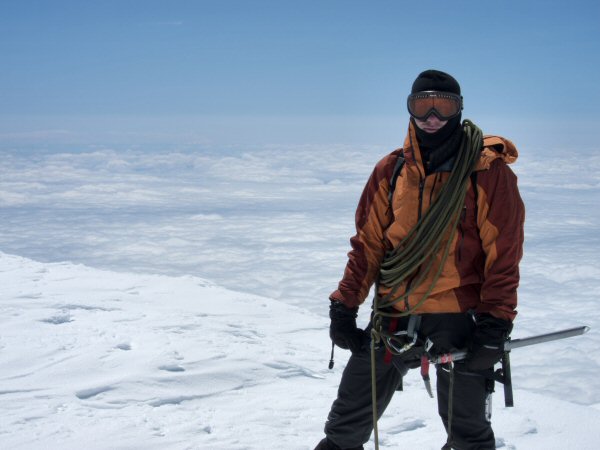Airman Plans Journey to Top of World

Air Force Capt. Colin Merrin, a member of the U.S. Air Force Seven Summits Challenge team, stands at the summit of Mount Rainier in the state of Washington. He plans to reach the summit of Mount Everest in May 2013. Courtesy photo
The Tibetans call it “Chomolungma,” meaning “Mother Goddess of the World.” GPS equipment measures its peak at 29,035 feet.
If all goes well for Air Force Capt. Colin Merrin, Mount Everest soon will be a line on his mountaineering resume that can’t be topped.
Merrin, a GPS operator from the 2nd Space Operations Squadron here, will begin the journey of a lifetime at the end of March. But before getting a call from the U.S. Air Force Seven Summits Challenge, he said, reaching the top of Mount Everest didn’t appeal to him.
“It’s really commercialized,” he explained. “Everest also has a bit of a weird stigma to it.”
Had the call come from anyone else, he said, he might have declined the invitation. But after hearing the greater cause, he added, he reconsidered.
The U.S. Air Force Seven Summits Challenge is an independent Air Force team whose vision since its creation in 2005 has been to reach seven famed summits and plant the American and Air Force flags. They climb to promote camaraderie and esprit de corps among airmen, highlight personal fitness and growth, and honor friends and colleagues who have died in the line of service since 9/11.
The group also supports the Special Operations Warrior Foundation, a charity that provides full scholarship grants and educational and family counseling to the surviving children of special operations personnel who have died. The organization also provides financial assistance to those severely wounded and their families.
“My primary motivation was the foundation,” Merrin said. “Climbing Everest has become a great way to support them, as well as the team.”
If successful in their endeavor, Merrin’s crew will become the first team of active-duty American military members to have reached Everest’s summit. The Seven Summits team also will be the first from any nation to have reached the top of all seven famous mountains that make up its quest. The others are Mount Elbrus, Mount Kilimanjaro, Mount Aconcagua, Mount McKinley, Mount Vinson and Mount Kosciuszko.
The journey to Everest’s peak doesn’t start at the base of the mountain, Merrin said. It starts months, sometimes even years, before.
“Everest isn’t a mountain you can just go [climb],” he said. “I started training hard three months before the trip to Mount Everest. I try to keep my training as specific as possible. If you want to get better at bench pressing, you bench press. If you want to get better at climbing mountains, you climb.”
For Merrin, Colorado Springs is a perfect training ground. With the base camp of Everest sitting at 17,500 feet, Pikes Peak serves as a good starting point for getting acclimated to higher elevations.
Because of the dangers associated with Mount Everest, climbers are encouraged to have glaciated mountain experience as well as high-altitude mountain climbs. In February 2011, Merrin was able to test his body’s response to extremely high altitudes when he reached the 22,841-foot summit of Aconcagua in Argentina’s Andes mountain range.
“The human body is not designed to endure the sort of conditions you find past 18,000 feet. There’s about 40 percent of the normal amount of oxygen, but my body did well,” Merrin said. “Knowing that reassures me for Everest.”
Though some dangers are out of his control, Merrin said, he draws confidence from the quality of his team.
“The team I’m going with is a strong group of elite climbers,” he said. “There’s a strong focus on risk management and safety.”
Officials with the 50th Space Wing here are extending their support to Merrin and the Seven Summits team.
“I am extremely proud of Captain Merrin. It’s a mind-bending prospect, if you think about it, to have a team of airmen standing on the top of the world’s tallest mountain,” said Air Force Lt. Col. Thomas Ste. Marie, the 2nd Space Operations Squadron commander. “The fact that Colin is a GPS operator is even more fitting.”
The first leg of Merrin’s journey is set to begin with a two-week, 40-mile trek to Everest’s base camp and an acclimation climb up nearby Mount Lobuche at the end of March.









